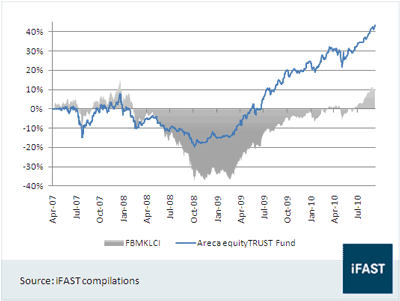Key Points
|
|
||||||||||||||||||||||||||
|---|---|---|---|---|---|---|---|---|---|---|---|---|---|---|---|---|---|---|---|---|---|---|---|---|---|---|---|
With 3Q 2010 passed, we brace ourselves for another round of corporate earnings and management commentaries in the coming months. At the time of writing, the Malaysia stock market is beset by profit-taking pressure amid weaknesses in the regional front. However, the stock market is expected to continue its upwards trend once volatility in the global markets eases off. It's a challenging situation, and no one can say for certain that it would turn out as expected. So where do the opportunities lie?
In this article, we spoke to Danny Wong, Chief Executive Officer of Areca Capital Sdn Bhd, on the market and economy, and where he thinks the upsides are.
iFAST Content Team (“iFAST”): The Malaysia stock market has rallied in these past four months or so amidst generally bearish sentiments in global markets. What do you make of this?
Danny Wong (“DW”): Our market has been playing catch up this year. When other markets rallied last year, we were deemed a defensive investment destination and lagged behind other recovering Asian economies. The recent rally can also be attributed to the current ‘feel good’ sentiment as a result of several economic initiatives announced by the authorities and also the loosening restrictions to Ringgit’s tradability.
Malaysia is returning to the radars of many fund managers. The ‘short term divergence’, i.e. where the Malaysia stock market performance didn't correlate with other Asian markets, will eventually normalise and converge. In the long run we will likely move along with other Asian markets with less volatility.
iFAST: How you do expect the Malaysia stock market to perform for the next one to two years given that earnings are expected to almost reach record levels by the end 2010? Are there any risks that may materialise?
DW: We still have some way to go based on our historical PE average. Moving forward, our stock market’s performance will closely reflect our economic growth. Now that the Najib administration has unveiled the Economic Transformation Plan (ETP) in more detail, the risk to the market now maybe whether these initiatives can be carried out. I believe this could be the beginning of a bullish phase over the next two to three years.
| Chart 1: Performance vs Benchmark (since inception) | Table 1: Top 10 Holdings | ||||||||||||||||||||||||
 |
|
||||||||||||||||||||||||
iFAST: Do you have a sector which you are more favourable on at present?
DW: Fundamentally driven stocks; sectors that represent or are proxy to economic growth, such as banking, resource-based companies and the potential beneficiaries of the ETP and the upcoming budget stand in good stead (refer to Table 1).
iFAST: Looking at your average account size, your niche is in servicing mass affluent investors. What do these investors typically look for in an investment?
DW: Our clients are typically high-net-worth investors with an average investment of above RM1 million. Most of these mass affluent investors are well diversified with sound investment experience and knowledge. They like our friendliness and transparent policies, direct and timeliness of information feeds. They look for regular updates on portfolio strategy and composition, direct fund manager’s inputs and advice and more importantly, a personalised service as opposed to product-pushing or marketing sales gimmicks.
iFAST: What is the one bad habit that you notice in the average investor?
DW: One of the most common misconceptions by average investors is that they believe that they can do a better job on their own. However in reality, professional fund managers, in the long run and on a consistent basis, substantially outperform individual investors in the areas of stock selection and portfolio risk management. An average investor can easily trade stocks in Malaysia, and most can claim that they manage to enter selective stocks at very attractive prices. Don't forget that trading and investing are two different things.
The crucial point is that they always behave emotionally, habitually listen to hear-says and are not disciplined. They also tend to move their target selling prices up and down because fear and greed influence their decision making.
 |
RELATED INFORMATION
Record High Earnings To Propel Record High Stock Market Levels
